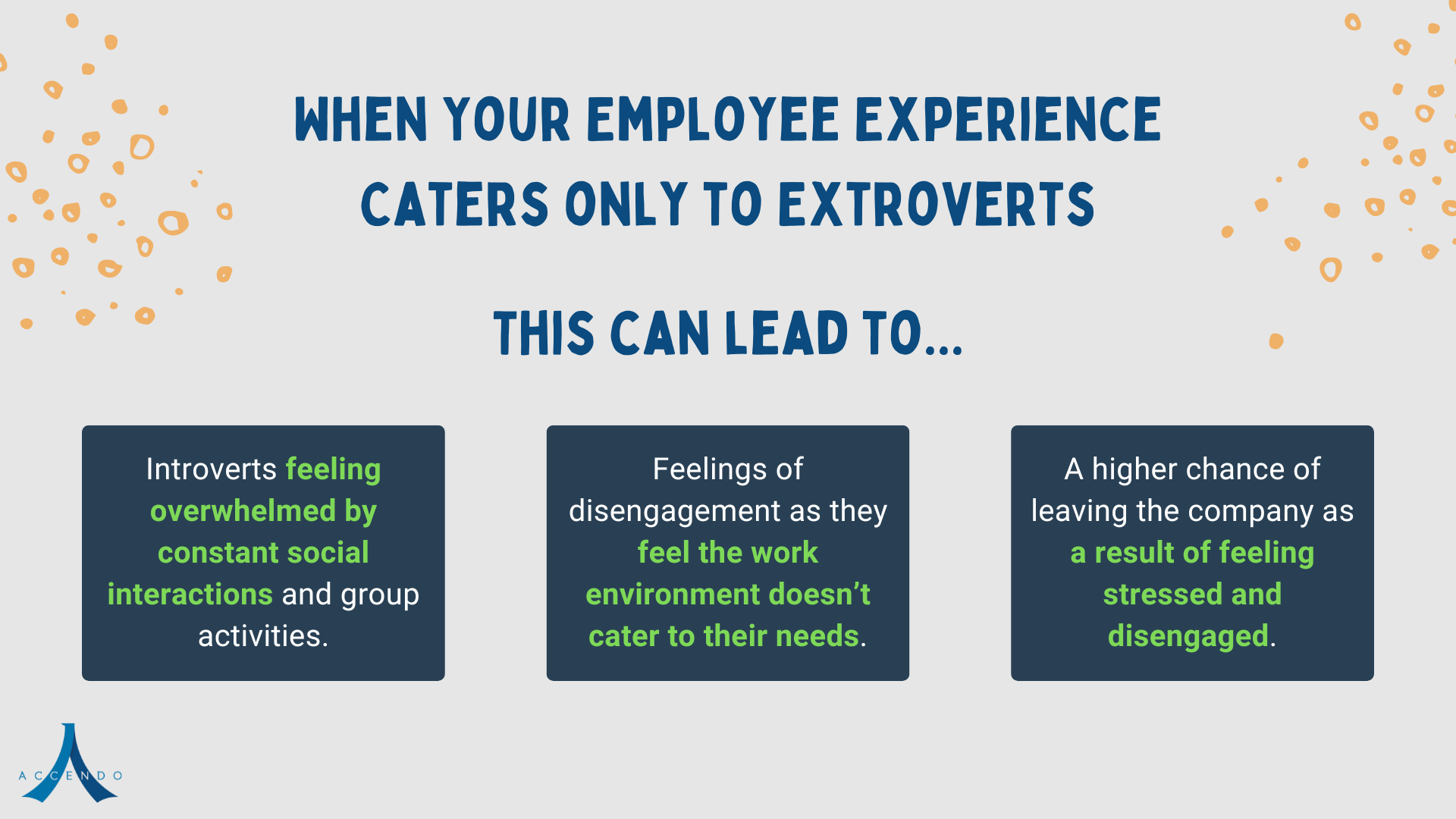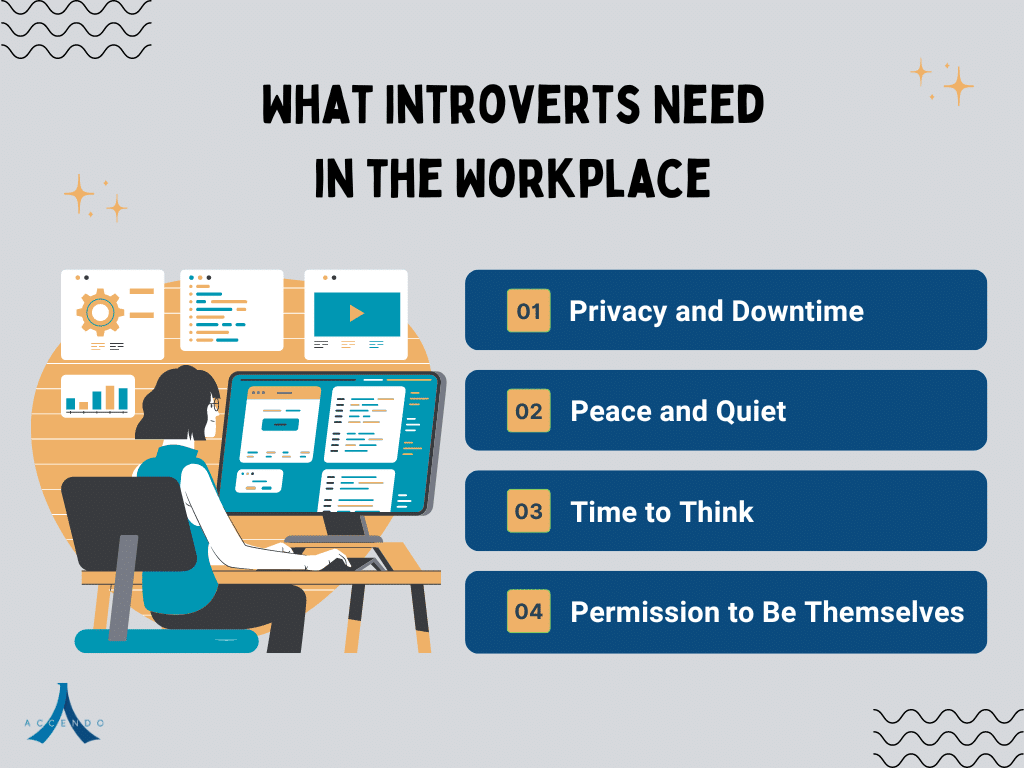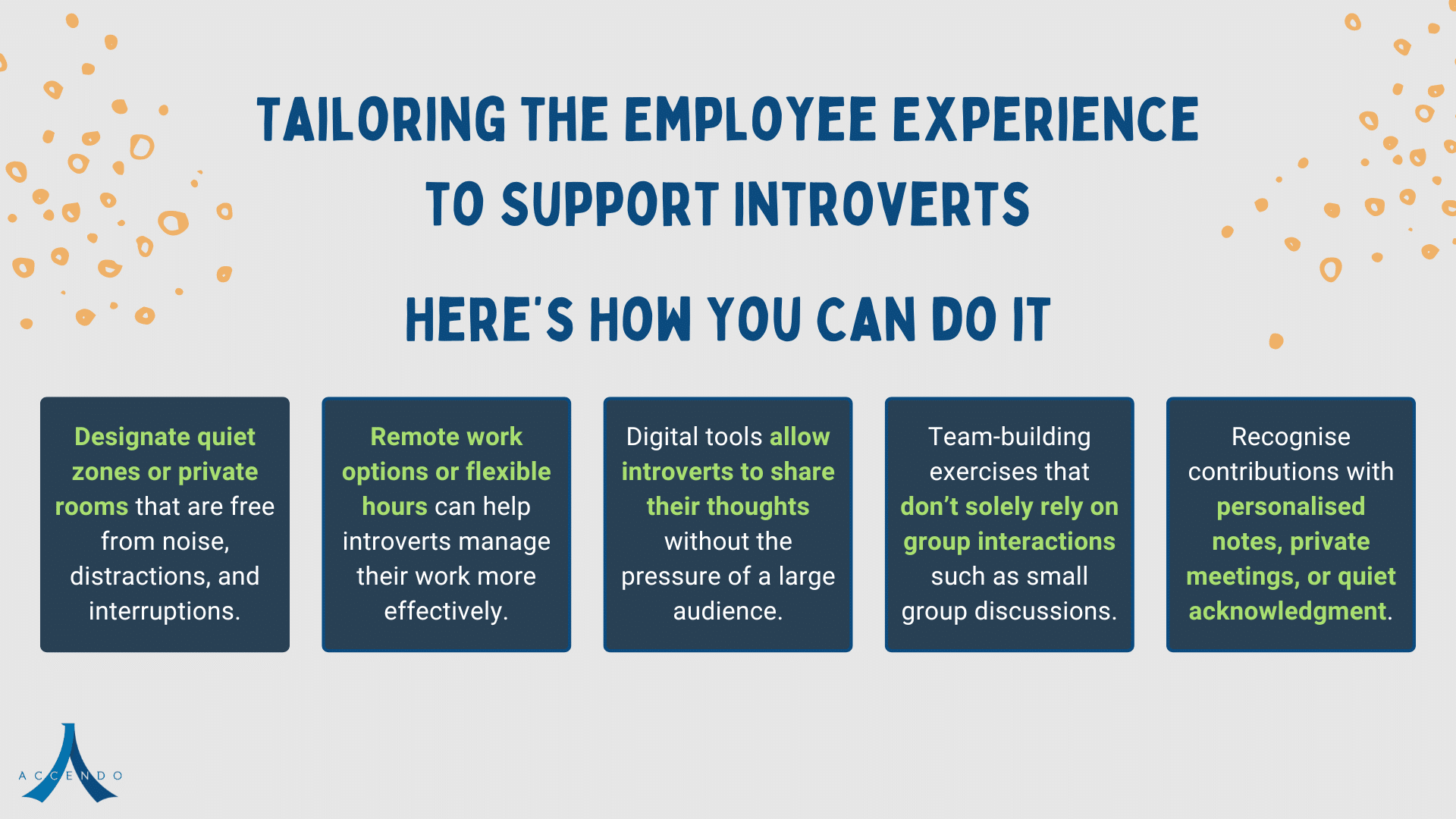Everyone should be treated equally, no doubt about it. But in management, some people need a different approach—introverts are one such example. They’re also why a one-size-fits-all strategy doesn’t always work. Workplaces often cater to extroverts, leaving introverts feeling sidelined. Introverts need quiet spaces, thoughtful communication, and flexible work options to thrive. Introverts matter just as much as extroverts, and when everyone feels valued, it leads to better productivity and less turnover. So, let’s start valuing the quieter voices—introverts have a lot to offer, and it’s time we made them feel at home.
What Does It Mean to be Introverted?
Extroversion and introversion are something we’re all born with – innate and rooted in our genes. But being introverted is normal.
Introverts prefer fewer stimulating environments as social events can be exhausting for them. They’re more sensitive to dopamine, so they need to take breaks and recharge after socialising to avoid feeling overwhelmed. This sensitivity often leads to the misconception that introverts are shy, aloof, or even arrogant.
The same can be said about an introvert’s performance. Extroverts tend to think aloud or speak up during meetings while introverts tend to prefer to quietly work through a problem or idea before voicing it. This can make extroverted employees appear more engaged or enthusiastic about a project.
In reality, they’re just wired differently.
Introverts might not seem as engaged by traditional metrics, but adjusting your employee experience strategies to suit their preferences can make them some of your most dedicated employees. Recognising and catering to their strengths helps them thrive in the workplace.
The Employee Experience Shouldn’t Only be for Extroverts
The workforce is a combination of extroverts and introverts. Extroverts thrive in social settings, group activities, and collaborative environments, whereas introverts prefer quiet, solo tasks, and thoughtful interactions.
When a company’s employee experience strategy primarily caters to extroverts, introverts may feel left out, stressed, or unappreciated. This can lead to:

- Feeling overwhelmed by constant social interactions and group activities, which can lead to mental exhaustion and burnout. Research published in the Journal of Applied Psychology indicates that introverts are more susceptible to burnout in environments that aren’t suited to their needs. The study also found that introverts working in highly social, open-plan offices reported higher levels of stress and burnout compared to their extroverted counterparts.
- Feeling disengaged as introverts feel that their work environment doesn’t cater to their needs. They might not contribute as much to meetings or participate in team activities, which can limit their growth and the value they bring to the company.
- A higher likelihood of leaving the company as a result of feeling stressed and disengaged. High turnover rates can disrupt team dynamics, increase recruitment costs, and lead to a loss of valuable knowledge and skills.
Companies continuing to ignore the needs of introverts might run into several outcomes:
- Disengaged employees are less productive. They may struggle to focus on environments that don’t support their working style, leading to lower output and quality of work.
- A workplace that doesn’t value all personality types can lead to a general sense of dissatisfaction. This lowers overall morale, which can spread and affect even those employees who were initially satisfied.
- Introverts often bring thoughtful, reflective perspectives that can lead to innovative ideas. If they aren’t encouraged to share their insights, the company misses out on potential innovations and creative solutions.
- If introverts feel neglected, they may share their negative experiences with friends. This can affect the company’s reputation and make it harder to attract top talent in future, especially those who value a supportive and inclusive work environment.
What Your Introverted Employees and Colleagues Need
Let’s break down what introverts generally need in the workplace.

Privacy and Downtime
Introverts can get overwhelmed by too much social interaction and stimulation. So, it’s important for them to have some quiet time to recharge either by using the headphones during lunch, take a solo coffee walk, or quietly working on a project on their own. This doesn’t mean they dislike their job or are antisocial. For introverts, alone time is a form of self-care. They need it to feel relaxed, happy, and calm at work.
Peace and Quiet
Background noise can affect an introvert’s productivity as it distracts them. To do their best work, introverts often need a quiet workspace without distractions like office chatter or open discussions. Unfortunately, these distractions are common in offices. The great thing about remote work is it gives people control over their environment, which can help introverts. Respecting an introvert’s need for quiet is a solid way to support them.
Open-plan offices, which are often designed with extroverts in mind, lead to a decrease in productivity for introverts. The constant noise and lack of privacy can significantly hamper their work efficiency.
A study by the International Journal of Stress Management
Time to Think
Avoid putting an introvert on the spot. Introverts process a lot of sensory information quickly and they need time to think before they speak. Singling them out in meetings or springing last-minute plans on them could stress them out and they might not be ready to respond. This doesn’t mean they shouldn’t share their thoughts. Make sure they have enough time to prepare before expecting them to speak up or interact.
Only 33% of U.S. employees are engaged at work. Disengagement is linked to environments that do not cater to diverse personality types. Introverts often feel left out in extrovert-centric workplaces, leading to lower engagement levels.
Gallup’s State of the American Workplace Report
Permission to Be Themselves
Introverts need to feel they can be themselves at work without judgment. No one wants to feel like the “office oddball” because they prefer eating lunch alone, or worry their manager thinks they’re not engaged if they don’t speak up much in meetings. When teammates and managers trust that introverts aren’t timid, uninformed, or antisocial, they set the stage for them to shine as brilliant, valuable team members.
Diverse teams are more innovative. Teams that include a mix of introverts and extroverts generate more creative solutions because they combine deep thinking and reflection with energetic brainstorming.
Research by Harvard Business Review
How to Tailor the Employee Experience to Support Them
When introverts feel understood and valued, they’re more engaged and perform better. Happy employees mean better outcomes for your company. It’s a win-win!
Improving the experience for introverts doesn’t have to break the bank. Simple tweaks like rearranging office spaces, offering flexible work options, and personalising recognition methods can make a huge difference. The return on investment is big: higher satisfaction, better retention, and boosted productivity.

Quiet Spaces
Introverts often find noisy, open-plan offices distracting and draining. A study by the International Journal of Stress Management found that open-plan offices lead to increased stress and reduced productivity for introverts.
Designating quiet zones or private rooms where employees can focus should be free from noise, distractions, and interruptions.
Google’s Zurich office features soundproof ‘phone booths’ and ‘focus pods’ that cater to those needing a break from the bustling open-plan environment or when employees want to work quietly.
Flexible Work Options
Flexibility in work schedules and environments can significantly boost introvert productivity and satisfaction. Research from Gallup indicates that employees who have the option to work remotely are 43% less likely to experience burnout.
Offer remote work options or flexible hours. Allowing employees to work from home or choose their working hours can help introverts manage their energy and work more effectively.
Buffer, a fully remote company, allows their employees to work from anywhere. This flexibility has contributed to high employee satisfaction and retention rates, as it accommodates various work styles and preferences.
Personalised Communication
Large meetings and public speaking can be overwhelming for introverts. A Harvard Business Review article highlights that introverts often perform better in one-on-one settings where they feel more comfortable expressing their ideas.
Try implementing more one-on-one meetings and use digital communication tools for feedback and discussions. This ensures that introverts could share their thoughts without the pressure of a large audience.
Atlassian encourages one-on-one meetings and uses tools like Confluence and Slack for asynchronous communication. This method allows employees to contribute at their own pace and comfort level.
Inclusive Activities
Traditional team-building activities can be daunting for introverts. According to a study published in the Journal of Business and Psychology, introverts often feel out of place in highly interactive group activities.
Designing team-building exercises that don’t solely rely on group interactions can be more appealing to introverts. It can be activities like book clubs, individual challenges, or small group discussions.
At HubSpot, employees participate in a variety of team-building activities, including “Learn Something” sessions where they can individually explore new topics and then discuss them in small, comfortable groups.
Recognition and Rewards
Public recognition can be uncomfortable for introverts. The Journal of Occupational Health Psychology found that introverts prefer private acknowledgment of their achievements.
Recognise introverts’ contributions in a way that respects their preferences. Personalised notes, private meetings, or quiet acknowledgment in smaller team settings can be more effective.Intel’s “Quiet Achiever” program recognises employees who prefer low-key acknowledgment. This program has successfully boosted morale and made employees feel valued without the need for public praise.
What Does This Mean for You?
Ensuring an inclusive employee experience is about making every employee, regardless of personality type, feel valued and supported. This inclusivity fosters a more harmonious and productive work environment. Catering to introverts by understanding their needs and creating spaces where they can thrive not only helps your employees but also drives engagement and productivity. So, let’s start paying attention to those quieter voices—they have a lot to offer!
Page Contents






